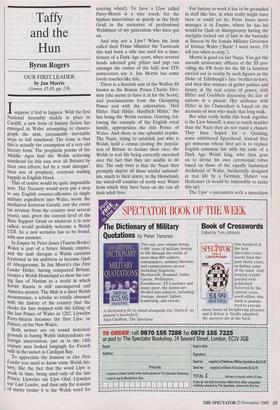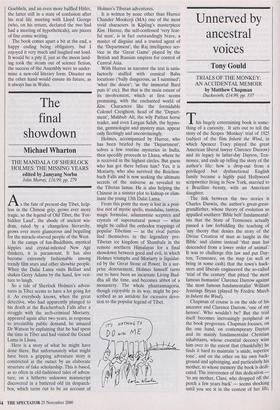Taffy and the Hun
Byron Rogers
OUR FIRST LEADER by Jan Morris Gomer, £5.95, pp. 136 Isuppose it had to happen. With the first National Assembly shakily in place in Cardiff, a new form of fantasy fiction has emerged in Wales attempting to choreo- graph the next, presumably inevitable steps to full statehood. The irony is that this is actually the resumption of a very old literary form. The prophetic poems of the Middle Ages had the Welsh achieving statehood (in this case over all Britain) by their own efforts, led by a 'matt darogan', their son of prophecy, everyone wading happily in English blood. This of course would be quite impossible now. The Treasury would soon put a stop to any English counter-offensive (a single military expedition into Wales, wrote the mediaeval historian Gerald, cost the entire tax revenue from the country over several years), and, given the current level of the Rate Support Grant or whatever it is now called, would probably welcome a Welsh UDI. So a new scenario has to be found, with new enemies.
In Empire by Peter Jones (Taurus Books) Wales is part of a future Islamic empire, and the mab darogan a Welsh careerist frustrated in his ambition to become Qadi of Abergavenny. In Jan Morris's Our First Leader Hitler, having conquered Britain, creates a Welsh Homeland to show the car- ing face of Nazism to a world in which Soviet Russia is still unconquered and America neutral. The Mab is a short Welsh monomaniac, a scholar so totally obsessed with the history of his country that the clocks for him stopped with the killing of the last Prince of Wales in 1282. Llywelyn Parry-Morris becomes the first Llyw, or Fiihrer, of the New Wales.
Both writers are on sound historical grounds in basing Welsh independence on foreign intervention, just as in the 14th Century men looked longingly for French sails in the sunset in Cardigan Bay.
To appreciate the humour in Our First Leader you need to know some Welsh his- tory, like the fact that the word Llyw is stuck in time, being used only of the last Prince, Llywelyn em Llyw Olaf, Llywelyn our Last Leader, and then only for reasons of metre (today it is the Welsh word for steering wheel). To have a Llyw called Parry-Morris is a nice touch, for the hyphen materialises as quietly as the Holy Grail in the surnames of professional Welshmen of my generation who have got on.
And why not a Llyw? When the Irish called their Prime Minister the Taoiseach this had been a title last used for a func- tionary of a Dark Age court, when severed heads adorned gate pillars and pigs ran amongst the rushes of the hall; now ITN newscasters use it. Jan Morris has some lovely touches like this.
There is a Scottish unit of the Waffen SS known as the Bonnie Prince Charlie Divi- sion (she seems to have it in for the Scots), and proclamations from the Occupying Power end with the exhortation, 'Heil Hitler. Hail Hitler. Henffych Hitler,' the last being the Welsh version. Goering, fol- lowing the example of the English royal family, appropriates the title Prince of Wales. And there is one splendid in-joke. The Nazis, trying to establish just who is Welsh, hold a census inviting the popula- tion of Britain to declare their race, the Welsh in real life being currently exercised over the fact that they are unable to do this. The only twist is that the Nazis then promptly deport all these wistful national- ists, much to their alarm, to the Homeland, the wired-off counties of north west Wales from which they have been on the run all their adult lives. For fantasy to work it has to be grounded in stuff like this, in what really might have been or could yet be. Peter Jones never manages it in Empire, where he has his would-be Qadi of Abergavenny having the daylights fucked out of him in the barracks at Brecon by the female Military Governor of Islamic Wales (Back! I want more. I'll tell you when to stop.').
Morris is good on her Nazis. You get the smooth aristocratic officers of the SS pro- viding the PR front for the SS (a function carried out in reality by such figures as the Duke of Edinburgh's late brother-in-law), and then that mixture of gutter politics and lunacy at the real centre of power, with Hitler and Goebbels discussing the fate of nations in a pissoir. Her audience with Hitler in his Chancellery is based on the accounts of men who made that long walk.
But what really holds this book together is the Llyw himself, a man so much madder than the Nazis they do not stand a chance. They have hoped for a Quisling, some embittered figurehead; instead they get someone whose first act is to replace English common law with the code of a Dark Age Welsh king, who then goes on to devise his own ceremonial robes based on those of the equally fantastical Archdruid of Wales, incidentally designed in real life by a German, Hubert von Herkomer (it would be impossible to make this up).
The Llyw' s encounters with a speechless Goebbels, and an even more baffled Hitler, the latter still in a state of confusion after his real life meeting with Lloyd George (who, on his return, declared the two had had a meeting of hypotheticals), are pieces of fine comic writing.
The book comes apart a bit at the end, a happy ending being obligatory, but I enjoyed it very much and laughed out loud. It would be a pity if, just as the moon land- ing took the steam out of science fiction, the success of the Assembly were to under- mine a new-old literary form. Disaster on the other hand would ensure its future, as it always has in Wales.






























































































 Previous page
Previous page